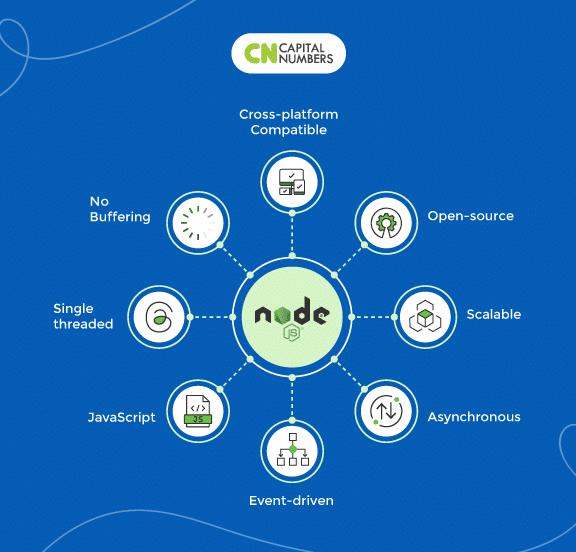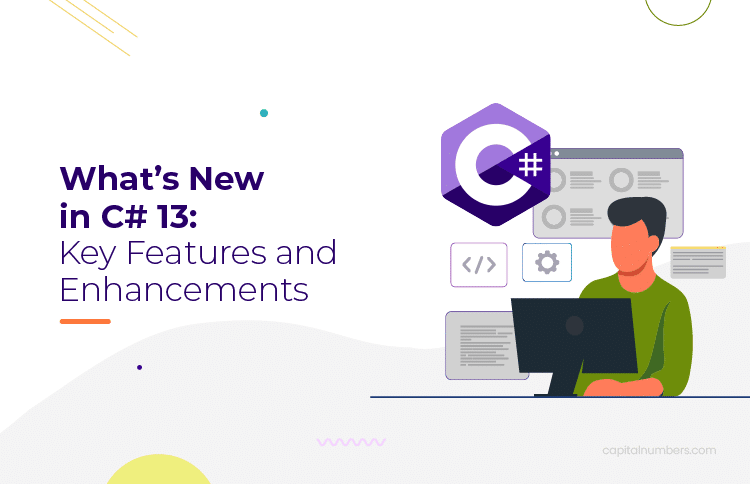Why Choose Node.js for Enterprise Application Development?
Table of Contents
Nowadays, it becomes important for businesses to have swift, secure, and scalable web app development. Node.js empowers enterprises with fast, scalable, secure, and productive cross-platform applications. Moreover, it helps serve the needs of the ‘modern users’.
Node.js development has completely changed how we do things in IT, allowing us to be 10 times more agile when working on the server side. As of September 2023, with 3276+ contributors on GitHub, Node.js has 97.6K Stars and 26.8K Forks.
Are you considering enterprise app development? Choose Node.js and hire Node.js developers for efficient development. And to know the reasons, read the blog.
What is Node.js?
Node.js is a cross-platform, open-source, cost-efficient, scalable, asynchronous, event-driven JavaScript runtime environment. It runs on the V8 JavaScript engine and executes JavaScript code outside a web browser.
Also, Node.js is lightweight as it works on an event-driven I/O model that is asynchronous and non-blocking. Also, it eliminates buffering.
Node.js operates on a single thread based on the “Single Threaded Event Loop Model” architecture that can handle multiple client requests.
It has minimal overhead, a small core, and uses a single programming language both on the client and server side. It results in two-way communication between the server side and the client side of a web application.

Most web-app technologies have various frameworks to support a specific use case in the development lifecycle. Node.js is no exception.
Node.js is often used with various frameworks and types like Web Application Framework (ex: Express.js, Koa.js), Full Stack Framework (ex: Meteor, Sails.js), Real-Time Framework (ex: Socket.io), API Framework (ex: Hapi.js, Loop Back), GraphQl Frameworks (Apollo Server), Testing Frameworks (ex: Mocha, Jest), Frameworks for Content Management (ex: Strapi, Keystone JS), Static Site Generator (ex: Gatsby). Node.js frameworks help ensure high performance, improve development, maintainability, and more.
The areas where Node.js is proving useful include
- I/O bound Applications
- Data-Intensive Real-time Applications (DIRT)
- JSON-based Applications
- Single Page Applications
- Data Streaming Applications
What is enterprise application development?
As the name implies, enterprise application development means developing software applications, especially for large organizations. Businesses develop these applications to address complex business processes. Moreover, these applications enhance collaboration, improve efficiency, and more.
Unlike consumer-oriented applications, these apps are more comprehensive and feature-rich. This is because they can handle various tasks and integrate with existing systems
Key features of enterprise app development include:
• Customization: Enterprise apps are designed to meet the organization’s specific requirements.
• Scalability: Enterprise apps should accommodate the company’s growth. They can handle increased user load and data volume over time.
• Security: Security is a top priority. These applications handle sensitive business data. Also, they withstand various cyber threats and adhere to industry regulations.
• Integration: Many enterprise apps need to seamlessly integrate with other software systems and tools used within the organization. This can include ERP (Enterprise Resource Planning) systems, CRM (Customer Relationship Management) software, HR management tools, and more.
• Collaboration: Enterprise apps often focus on enhancing communication and cooperation among employees. It could involve features like document sharing, real-time messaging, and project management capabilities.
• Workflow Automation: Enterprise apps are built to automate and streamline complex business processes. It can lead to increased efficiency and reduced manual work.
• Analytics and Reporting: These applications often include advanced analytics and reporting features. All these allow organizations to make data-driven decisions.
• Multi-Platform Support: Enterprise apps may need to run on diverse platforms. It includes desktop computers, mobile devices, and more.
• Maintenance and Support: Enterprise apps require ongoing maintenance, updates, and support to meet the organization’s changing needs and stay secure.
• User Experience: While functionality is crucial, the user experience is also important. Employees should be able to use the application intuitively and efficiently.
Advantages of Node.js for enterprise app development
There are various benefits of Node•js when you choose it for enterprise app development. Let’s explore this in detail –
1. Ensures efficiency and scalability
An enterprise application should be scalable. Scalability is important because you never know when your business will outgrow its current size. Node.js can handle large volumes of requests without slowing down or becoming unstable. So, it is a great choice for enterprise applications needing to scale up.
Node.js is built upon the V8 runtime of Google Chrome. Written in C++, developers can use Node.js on various operating systems. The V8 engine is popular for facilitating speed and performance in large enterprise applications.
Also, Node.js is a single-threaded platform carrying out I/O operations using callbacks and event lockup. This unique architecture allows developers to manage several connections simultaneously.
2. Enables cross-functional teams to work effectively
A cross-functional team is characterized by how each member is associated with every phase of the development process. It is a key principle of agile methodology. Besides, it’s vital to get different perspectives for shaping the app.
Node.js is a JavaScript framework to use for both front-end and back-end. So, using Node.js for enterprise apps lets you pay attention to the client and server side. And this makes your enterprise app foolproof, reducing the need for changing things later.
3. NPM registry reduces development time and costs
Node Package Manager allows developers to install, update, and use open-source software modules. With Node.js, developers don’t need to write common features from scratch and, thus, avoid complexity and save time.
Also, NPM helps manage local dependencies of project tools, even the globally installed ones. lock.json, a package of NPM, displays all project dependencies. So, you can download standalone tools to use right away. Using NPM, you can manage various code versions and code dependencies with minimum manual effort. Besides, the enterprise version of NPM enables you to run the NPM infrastructure behind your company’s firewall.
4. Faster development
As comes with an easy learning curve, Java and .NET developers can easily learn Node.js. Also, it is based on JavaScript, making it easier to manage both the front-end and back-end of the application without setting up separate teams for each.
No extra skills are required for web developers to build desktop applications. They can reuse code and tools across platforms like Linux, Windows, and macOS. Also, they can easily access developer tools for browsers, including Google Chrome Developer Tools, for easier debugging. Besides, simple deployments help you get immediate feedback from the production environment.
All these contribute to faster development and a shorter time to market, ultimately leading to higher revenue for enterprises
5. Microservices architecture makes scaling easier
A common reason businesses use Node.js for developing enterprise apps is its ability to help with app upgrades. Most enterprise projects start as an MVP release. With time, new features are added to improve the app. But developers often face difficulties when scaling the app.
To combat this challenge, they can use Node.js. Node.js allows them to use the microservices architecture for app development. As a single self-contained unit, a microservice can work independently of other units. Developers can work on these units separately. Thus, different teams working in various programming languages can collaborate on a project. It helps cut costs and improve the project efficiency.
Also, using microservices patterns, you can easily manage your microtasks like CMS, email marketing, deployment, and reporting and develop high-performance apps quickly and efficiently.
6. Caching makes apps faster
Developers building enterprise apps with Node.js can benefit from caching singular modules. When a developer requests for the first module in Node.js, it caches this automatically on the application memory. Node.js’ caching ability helps a webpage load faster as the app does not need to re-execute the code repeatedly.
Also, caching in Node.js helps users navigate the app easily. As the response time of apps is faster, it improves user experience. And faster loading time improves apps’ SEO rankings. So, Node.js also contributes to enterprise apps’ marketing.
7. Monitoring and debugging
Node.js offers a robust set of monitoring and debugging tools and frameworks. Monitoring tools help gather various metrics, such as CPU usage, response times, memory consumption, and error rates. By analyzing these metrics, developers can identify issues or abnormal behavior in the application. Effective monitoring enables proactive responses to performance degradation.
Besides, debugging tools and frameworks, such as the Node.js Debugger and popular IDE integrations, enable developers to set breakpoints in their code. Also, they can inspect variables and step through the execution flow to pinpoint the source of bugs. Proper debugging reduces development time and ensures the reliability of the application.
These processes are vital for ensuring the performance, stability, and reliability of Node.js applications, especially enterprise applications.
8. Support for containers
Node.js works well with containerization technologies like Docker. Docker allows developers to create lightweight containers that encapsulate the Node.js application code, its dependencies, and the runtime environment. Developers can develop and test Node.js applications in Docker containers locally. They know that these applications will behave the same way when deployed in a containerized production environment.
Each Docker container is isolated from the host system and other containers. This isolation ensures that Node.js applications running in containers do not interfere with each other or with the host OS. It also increases security by reducing the attack surface.
Docker images can be versioned, allowing for the management of different versions of Node.js applications. This is particularly valuable in enterprise settings where legacy applications may need to coexist with newer versions.
9. Cost-effective
Node.js is known for its lightweight and non-blocking architecture. It consumes less server resources compared to some other technologies. So, it allows enterprises to run more applications on the same infrastructure, reducing hardware and operational costs.
Also, Node.js is compatible with most cloud providers, offering cost-effective hosting options and scalability features. Enterprises can take advantage of cloud resources. They can pay only for what they use without the need for significant upfront investments in hardware.
Besides, development speed, code reusability, support from a vibrant community, monitoring capabilities, reduced maintenance complexity, etc., collectively contribute to lower development and operational costs in enterprise applications.
Also Read – 7 Essential Enterprise Software Solutions That Every Business Needs
Bottom Line
As you can see, there are various reasons for choosing Node.js for enterprise application development. Whether you want to build an MVP or scale your web app to the next level, Node.js is the right choice to address your business’s changing needs.
Do you want to hire Node.js developers to build an enterprise app solution? Look no further than Capital Numbers, an award-winning software development company in India. We have 700+ expert developers and a track record of serving top-notch clients globally. We deliver quality products quickly and affordably. Eager to discuss your project ideas? Book a call today!


 Web Development
Web Development Cloud Engineering
Cloud Engineering Mobile App Development
Mobile App Development AI/ML/GenAI
AI/ML/GenAI E-commerce
E-commerce Software Development
Software Development UI/UX
UI/UX QA
QA Dedicated Teams
Dedicated Teams













